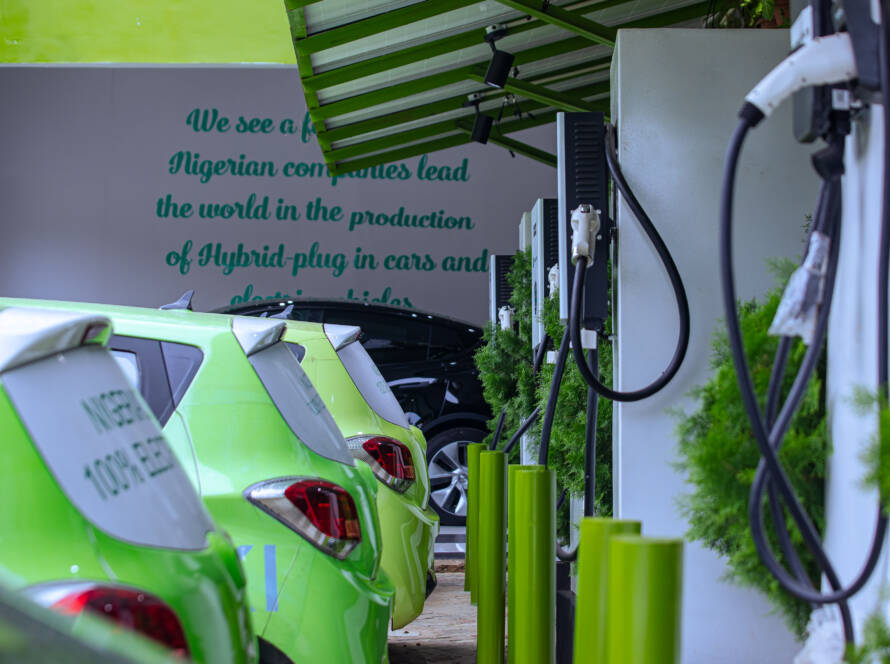The argument is often that electric cars themselves don’t release emissions but the process of generating the electricity they use pollutes the environment. By this metrics, let’s also look at the process involved in making petrol and diesel that internal combustion engine vehicles use.
Extraction
The raw material for petrol or diesel is crude oil, which is extracted from nearly 6,000 ft above the Earth’s surface with something called a pump jack.
It takes about 9,960kwh of electricity to power one pumpjack a month. That amount of electricity is enough to power a Tesla Model 3 for three whole years. There are about 7,000 oil wells in Nigeria using pumpjacks every day. That’s a lot of electricity being used just to get the oil out of the ground.
What about the offshore oil rigs, the ones we see installed in the middle of the sea? Offshore rigs are powered by diesel generators. Each of those oil rig generators uses about 30 metric tonnes of diesel per day, according to the leading oil and gas association Ipieca.
We spend this incredible amount of energy just to extract the raw material used to make fuel—a liquid that emits harmful substances to our environment when we put them in our cars.
If you combine the exhaust fumes emitted by ICE cars with the emissions generated when extracting crude oil from the ground and all those other millions of gallons of crude oil that spill into the Niger Delta, causing serious damage to the environment and local communities, then you would have scratched the surface of how much pollution and environmental degradation fossil fuel causes.
Transportation
Want to go deeper? Let’s talk about how the oil is transported.
Through oil pipelines
The world consumes ~100 million barrels of crude oil a day. Most of it is transported through crude oil pipelines. These pipelines use pump stations that also consume an enormous amount of energy.
Through ships
Oil is also transported through ships. Ships use the cheapest, dirtiest fuel in order to cut costs. That’s why ships are among the largest pollution sources on the earth, with a staggering 1 billion metric tonnes of Co2 emitted yearly. Because of the sheer amount of co2 ships carrying oil emit, many countries don’t allow them near their coastlines. They will have to be towed from a safe distance to the shores.
Refining
The process of refining crude oil involves heating it up to nearly 450 degrees Celsius. Heating up millions of barrels of crude oil every day to this level of temperature consumes a lot of energy and releases enormous amounts of CO2 into the air. The pollution caused by crude oil refineries is so much that refineries always create health hazards like lung disease in any community where they are found.
The refined crude oils are transported to fuel stations in trucks that use diesel fuel, creating more tailpipe emissions and pollution. The fuel is then burned in ICE cars running inside cities where people live. ICE cars are extremely wasteful and inefficient. About 70% of the energy the cars get from burning the fuel in their engines is dissipated as heat in the environment. Only 30% of all that dirty, environmentally costly fuel is actually used by the car, which is ridiculous.
Consider the millions of barrels of crude oil that are heated each day, and all the energy that’s wasted just to get that fuel into cars. When it’s finally in cars, an entire 70% is dissipated as tailpipe emissions back into the atmosphere, causing all sorts of climate hazards and health complications for communities.
At this point, I think we agree that the process of refining crude oil is dirty and environmentally expensive from start to finish.
Now, let’s compare that with the process of generating electricity for powering electric cars.
Electricity does not need to be rigged from the ground or transported in trucks or ships or ‘burned’ where people live. Electricity generation in your cities and neighborhoods and houses doesn’t cause lung cancer. Yes, some amount of electricity is generated from the burning of coal, natural gas, and other energy sources, but these power stations are placed far away from the cities, and the energy they generate is transported through powerlines. This keeps the people from any direct contact with pollution.
What about lithium mining for EV batteries?
Mining lithium creates emissions, but not as much as the EV naysayers make us believe. Lithium has a circular economic value. It is mined once and can be reused in any number of vehicles. For example, If we have 20 million cars on the road running on batteries, they would need a fixed amount of lithium. But if we have 20 million fossil-fuel cars on the road, those vehicles will continuously use more and more extracted crude oil, causing carbon emissions throughout their lifetime.
Take Australia for example. It’s a small, sparsely populated country with about 26 million people. Australia mines an entire 50% of the world’s lithium and refines only 0.25 % of the world’s oil. But guess what is the biggest risk to human health and the environment today in Australia? It’s oil refining.
Oil refining creates environmental risks at a much bigger scale than all the lithium mining plants anywhere. One major oil spill does more damage than all the lithium mining in the world combined.
It’s ridiculous that we spend so much electricity to extract oil from the ground. We then create an enormous amount of carbon dioxide emission by refining and transporting the oil to fueling stations.
Oil production is an incredibly dirty and wasteful business.
Nigeria is on the path to a green economy by 2060. The choice between continuing the status quo of a fossil-fuel-driven economy or embracing a cleaner, more efficient, and sustainable future is clear. The environmental and economic toll of petrol and diesel vehicles is undeniable, but the path to a green future is paved with opportunities for innovation and growth.
At Possible EVS, we believe in a future where our cities are powered by clean energy, where transportation is not a burden on the environment, but a means for more sustainable infrastructural development.


